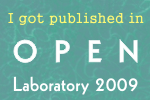Crowdsourcing genomics
Miami University has joined the National Genomics Research Initiative (NGRI) offered by HHMI Science Education Alliance (SEA) in their Phage Genomics course. The students go directly into the lab, participating in an authentic research experience. In a full-year academic course they:
- isolate and characterize bacterial viruses from their local soil
- prepare the viral DNA for sequencing
- annotate and compare the sequenced genome
The Department of Microbiology at Miami University is offering this course in the upcoming year: four of our faculty will be teaching it. Phage isolation, electron microscopy, DNA sequencing in the first semester, annotation and comparative genomics in the second. And I get to teach the bioinformatics bit: annotation and comparative genomics. Woo-hoo! The great thing about this course, is that unlike most lab courses, the students (and faculty) will be setting up experiments intended not only to teach, but also to discover something new. Also, the results of the research are meaningful. Genomics data generated by student participants will be used by other researchers to answer medical, ecological, and evolutionary scientific questions. Bacteriophages (viruses that infect bacteria) affect the biopsphere so profoundly, it is almost impossible to imagine. Their sheer biomass is equal to that of 75 million blue whales, and marine bacteriophages kill about half of marine microbes every day. Bacteriophages have a huge host range, mind-boggling number of particles in the biosphere (1030) and, above all, the genetic diversity is unmatched by all other life combined. Participating students will see how their data may be used by other researchers in the SEA network — truly collaborative, crowdsourced science. Here are the genomic sequences of SEA-sequenced bacteriophages already in GenBank.
If you are an incoming Miami freshman, and want to jump in and do some real science, it doesn’t get much better than this. Check out our course page, and ask about the Bacteriophage Biology course in your orientation. You may even get your name on a paper like these students from other participating universities.
Pope, W., Jacobs-Sera, D., Russell, D., Peebles, C., Al-Atrache, Z., Alcoser, T., Alexander, L., Alfano, M., Alford, S., Amy, N., Anderson, M., Anderson, A., Ang, A., Ares, M., Barber, A., Barker, L., Barrett, J., Barshop, W., Bauerle, C., Bayles, I., Belfield, K., Best, A., Borjon, A., Bowman, C., Boyer, C., Bradley, K., Bradley, V., Broadway, L., Budwal, K., Busby, K., Campbell, I., Campbell, A., Carey, A., Caruso, S., Chew, R., Cockburn, C., Cohen, L., Corajod, J., Cresawn, S., Davis, K., Deng, L., Denver, D., Dixon, B., Ekram, S., Elgin, S., Engelsen, A., English, B., Erb, M., Estrada, C., Filliger, L., Findley, A., Forbes, L., Forsyth, M., Fox, T., Fritz, M., Garcia, R., George, Z., Georges, A., Gissendanner, C., Goff, S., Goldstein, R., Gordon, K., Green, R., Guerra, S., Guiney-Olsen, K., Guiza, B., Haghighat, L., Hagopian, G., Harmon, C., Harmson, J., Hartzog, G., Harvey, S., He, S., He, K., Healy, K., Higinbotham, E., Hildebrandt, E., Ho, J., Hogan, G., Hohenstein, V., Holz, N., Huang, V., Hufford, E., Hynes, P., Jackson, A., Jansen, E., Jarvik, J., Jasinto, P., Jordan, T., Kasza, T., Katelyn, M., Kelsey, J., Kerrigan, L., Khaw, D., Kim, J., Knutter, J., Ko, C., Larkin, G., Laroche, J., Latif, A., Leuba, K., Leuba, S., Lewis, L., Loesser-Casey, K., Long, C., Lopez, A., Lowery, N., Lu, T., Mac, V., Masters, I., McCloud, J., McDonough, M., Medenbach, A., Menon, A., Miller, R., Morgan, B., Ng, P., Nguyen, E., Nguyen, K., Nguyen, E., Nicholson, K., Parnell, L., Peirce, C., Perz, A., Peterson, L., Pferdehirt, R., Philip, S., Pogliano, K., Pogliano, J., Polley, T., Puopolo, E., Rabinowitz, H., Resiss, M., Rhyan, C., Robinson, Y., Rodriguez, L., Rose, A., Rubin, J., Ruby, J., Saha, M., Sandoz, J., Savitskaya, J., Schipper, D., Schnitzler, C., Schott, A., Segal, J., Shaffer, C., Sheldon, K., Shepard, E., Shepardson, J., Shroff, M., Simmons, J., Simms, E., Simpson, B., Sinclair, K., Sjoholm, R., Slette, I., Spaulding, B., Straub, C., Stukey, J., Sughrue, T., Tang, T., Tatyana, L., Taylor, S., Taylor, B., Temple, L., Thompson, J., Tokarz, M., Trapani, S., Troum, A., Tsay, J., Tubbs, A., Walton, J., Wang, D., Wang, H., Warner, J., Weisser, E., Wendler, S., Weston-Hafer, K., Whelan, H., Williamson, K., Willis, A., Wirtshafter, H., Wong, T., Wu, P., Yang, Y., Yee, B., Zaidins, D., Zhang, B., Zúniga, M., Hendrix, R., & Hatfull, G. (2011). Expanding the Diversity of Mycobacteriophages: Insights into Genome Architecture and Evolution PLoS ONE, 6 (1) DOI: 10.1371/journal.pone.0016329




















UCSC has been doing this course for three years. Now that the grant funding has run out, they are looking for ways to make it a permanent course. That is difficult in California’s budget-chopping frenzy, but I think they’ll keep it going for at least another year.